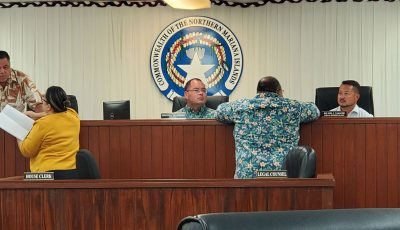Rushing to the finish line, again
Within a month after Gov. Eloy S. Inos pointed out that only eight of the 19th Legislature bills became public law in the first nine months of the year, seven other bills immediately cleared the Senate and the House of Representatives and became law. So what used to be an average of almost one new law signed every month, became seven laws a month.
But then again, it’s not the quantity and the speed with which bills become law that matter most, but the quality of legislation that’s reaching the governor’s desk.
One such bill that shouldn’t be rushed to the finish line is the measure that amends provisions of the Saipan casino law, the same bill that Attorney General Edward Manibusan earlier said would make the Commonwealth Casino Commission a prime candidate for corruption.
The Senate insists their latest version of the bill addresses many of the AG’s concerns. These include those that would have exempted the commission from the Open Government Act so they can meet in secret and not open records for public inspections, among other things.
But more time is needed to review the latest version of the measure, not only by lawmakers but also the general public. Voting on a substitute casino amendment bill on the same day that copies of that substitute version were distributed to members—like what the Senate did recently, and the House before that—needs to stop.
Consider this. Senate floor leader Arnold Palacios (R-Saipan) himself conceded that members did not fully grasp “problematic language” of the bill that came from the House and the version that the AG commented on, that’s why the Senate recalled that bill, substituted it, and then passed the new bill—on the same day.
Whether members could fully grasp the language of the substitute bill within hours of seeing it and then passing it is everyone’s guess.
Prior to recalling the bill, senators passed yet another casino-related bill without public input, without much thought, and without much deliberation. For Senate President Victor Hocog (R-Rota) to say he had no idea that Sen. Frank Borja’s Committee on Resources, Economic Development and Programs sought the AG’s comment tells a lot about how the Senate handles pieces of legislation in its court.
And even when the Senate recalled the bill and passed another version of it after learning of the AG’s concerns, some of the AG’s important and sensible recommendations still fell on deaf ears.
For example, the Senate still increased each casino commissioner’s annual salary from $40,000 to $65,000, which, as the AG pointed out, is higher than the salaries of essential government personnel like the public defender, public auditor and lieutenant governor. This is at a time when only a supposed “live training facility” is operating.
“The Legislature should determine whether the proposed salary increase for the commissioners is appropriate,” the AG wrote. The Senate “determined” a salary increase for casino commissioners is appropriate, and so is the salary raise for the executive director, from $85,000 to $100,000 a year.
Moreover, were it not for Manibusan’s concerns, the bill’s previous language could have allowed gambling to take place in any facilities like restaurants, Laundromats, and concession stands.
Worst of all, the bill could have granted the Casino Commission “extraordinarily broad” exemptions from the Open Government Act, freeing them from government oversight, making them a prime candidate for corruption, allowing them to meet in secret, and authorizing its personnel to gamble at the casino, “either as part of a phony investigation, or simply because the personnel wanted to gamble.”
Once again, many of lawmakers’ actions on the Saipan casino amendment bill do not inspire public confidence and trust. The recurring theme seems to be that of ramming down everyone’s throat bills that have to do with the Saipan casino, from legalizing it without public hearing and without a committee report, to amending it again and again.
If there’s a provision in HB 19-95 that really need to be tackled immediately—or separately—it’s the one that would provide funding for commission employees past their 90-day contract cycles.
That being said, the House must reject the Senate substitute, and a bicameral panel must be formed to subject the bill to further review and deliberation. The conference committee could further seek input on the legislation from the general public and certain government entities besides the Office of the Attorney General. The people expect due diligence from those they entrusted to serve the CNMI’s best interests.



























